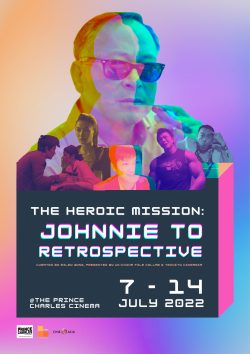 The Heroic Mission: Johnnie To Retrospective will be held from 7 – 14 July 2022 in London. Three films from Hong Kong director Johnnie To will be screened at The Prince Charles Cinema, London.
The Heroic Mission: Johnnie To Retrospective will be held from 7 – 14 July 2022 in London. Three films from Hong Kong director Johnnie To will be screened at The Prince Charles Cinema, London.
‘The Heroic Mission’ is named and inspired by two titles of To’s films during the 90s: The Heroic Trio (1992) and The Mission (1998). The imagery of ‘hero’ created by To in most of his films represents a fated statement: ‘We all came with a mission’. Influenced by the film directors King Hu, Sam Peckinpah and Akira Kurosawa, To enjoyed his international breakthrough with a film noir signature and gangster films. To specialises in angling at different characters in daily life and portraying their inner struggles and conflicts between desire and making choices. To once said, ‘I can see two to three faces of a person.’ Three films have been selected in this programme and each tells a different story about heroism.
During the mid-90s, by facing the depression of Hong Kong cinema, To decided to establish his own production studio, Milkyway Image, with his colleague Wai Ka Fai back in the time of working in television. Milkyway Image employs a unique business strategy among Hong Kong film production companies and produces both experimental and commercial films. The selected films in this programme are also productions of Milkyway Image.
To furthers his discussion on humanity and our ‘principles’ in Life Without Principle. Those ‘principles’ could refer to honesty, kindness and loyalty. To discovers how the principles can be distorted in this crazy capitalist city. The story revolves around three characters: an ordinary bank teller forced to sell high risk securities to her customers, a small-time thug who delves into the futures index hoping for easy money, and a police inspector who is suddenly desperate for money. Three characters and three separate stories that never meet in the film but their fates cross.
After revealing the multiple faces of humanity, To still believes in kindness. The first half of Running on Karma reveals To’s understanding of ‘karma’ which is fated and unshakeable. When Lee Fung-yee finds out she has to die because of her past life as a Japanese soldier killing civilians, she is confused and wonders why this happened to her even though she was so kind and never had done anything wrong. To denotes his attitude and opinion on how we should live with our fated Karma. Lee Fung-yee decides to make her death more meaningful. Running of Karma has been identified as one of the most significant and original films of To, in collaboration with his life-long colleague Wai Kar Fai.
In Breaking News, To manifests the missions of the police and the villain. Demonstrating the complicity of the police organisation, To challenges the purposes behind the mission of the police, and whether it is only the responsibility to make citizens safe. Inspector Rebecca decides to redeem the police credibility and its collective reputation by directing a ‘show’ in an operation and utilising the power of media to create a perfect image of heroism. Detective Cheung is always out of command and deviates from the operation, which indicates his self-desire and paranoia of catching criminals. On the other hand, To has shown the tenderness and human side of the fierce villains but does not beautify or justify their brutal violence. The killer in the film just wants to go home and the leader of the thieves dreams of setting up his own small business after their job. There is hope behind their mission.
Presented jointly by UK-China Film Collab and Trinity CineAsia, this programme provides a wider context of the societal changes in Hong Kong in recent decades. It wishes to inspire a new scope for ideas and discussion. Curated by Riley Wong, MA Film Curating student at Birkbeck University of London, who wishes to bring more Hong Kong auteurs to the UK audiences and provides them a better understanding of Hong Kong cinema











